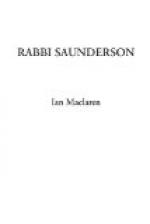“He’s cuttit aff seevin feet, and rins up it tae get his tapmaist bukes, but that’s no’ a’,” and then Mains gave it to be understood that the rest of the things the minister had done with that ladder were beyond words. For in order that the rough wood might not scar the sensitive backs of the fathers, the Rabbi had covered the upper end with cloth, and for that purpose had utilised a pair of trousers. It was not within his ability in any way to reduce or adapt his material, so that those interesting garments remained in their original shape, and, as often as the ladder stood reversed, presented a very impressive and diverting spectacle. It was the inspiration of one of Carmichael’s most successful stories—how he had done his best to console a woman on the death of her husband, and had not altogether failed, till she caught sight of the deceased’s nether garments waving disconsolately on a rope in the garden, when she refused to be comforted. “Toom (empty) breeks tae me noo,” and she wept profusely, “toom breeks tae me.”
One of the great efforts of the Rabbi’s life was to seat his visitors, since, beyond the one chair, accommodation had to be provided on the table, wheresoever there happened to be no papers, and on the ledges of the bookcases. It was pretty to see the host suggesting from a long experience those coigns of vantage he counted easiest and safest, giving warnings also of unsuspected danger in the shape of restless books that might either yield beneath one’s feet or descend on one’s head. Carmichael, however, needed no such guidance, for he knew his way about in the marvellous place, and at once made for what the boys called the throne of the fathers. This was a lordly seat, laid as to its foundation in mediaeval divines of ponderous content, but excellently finished with the Benedictine edition of St. Augustine, softened by two cushions, one for a seat and another for a back. Here Carmichael used to sit in great content, smoking and listening while the Rabbi hunted an idea through Scripture with many authorities, or defended the wildest Calvinism with strange, learned arguments; from this place he would watch the Rabbi searching for a lost note on some passage of Holy Writ amid a pile of papers two feet deep, through which he burrowed on all-fours, or climbing for a book on the sky-line, to forget his errand and to expound some point of doctrine from the top of the ladder.
[Illustration: Searching for A lost note]
“You’re comfortable, John, and you do not want to put off your boots after all that travelling to and fro? Then I will search for Barbara, and secure some refreshment for our bodies”; and Carmichael watched the Rabbi depart with pity, for he was going on a troublous errand.




